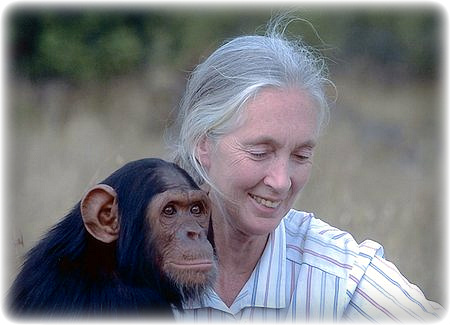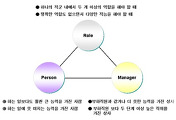
당신이 싫어하는 사람을 채용하라 (Hiring People You Don't Like)
1957년 어린시절 부터 어머니로 부터 타잔이나 두리틀 박사와 같은 책을 전해 들으면서 동물에 대한 관심이 많았던 23살의 제인 구달 (Jane Goodal)이 아프리카에 있는 친한 친구를 방문해서 다양한 아프리카 동물에 대한 호기심을 가지고 둘러보면서 여행을 하고 있을 때, 우연히 루이스 리키 (Dr. Louis Leakey) 라는 유명한 인류학자를 만나게 되었고 그에게 동물 연구를 계속 할 수 있도록 도와 달라고 요청을 하였습니다.
당시 리키 박사가 봤을 때 새파랗게 젊은, 그리고 생물학이나 인류학에 대한 지식이 거의 전무하던 제인 구달을 봤을 때 "어찌 전문지식도 없는 젊은 여자가 이런 험한 아프리카 오지에서 힘든 연구를 할 수 있을까?" 라는 생각이 들었던 것도 무리는 아닐겁니다.
하지만, 곧 그녀의 어설프지만 진지한 태도와 연구에 대한 열정 그리고 끈질긴 집녑을 알아보고 그녀를 자신의 비서이자 조교로 채용하고 그녀에게 자신의 연구를 도울 수 있는 기회를 주었던 것입니다. 그리고는 기존의 학문이나 이론 연구방법 등에 물들지 않은 그녀가 오히려 새로운 방식의 연구를 할 수 있겠다고 판단하고 1960년 부터 동아프리카의 탄자니카 호수근처에서 침팬지 연구를 시작할 수 있도록 적극 돕게되었고, 이후 제인 구달은우리에게 잘 알려진바와 같이 침팬지의 사회성과 그들의 생활양식에 대한 필생의 연구를 할 수 있게 된 것입니다. [Source: 제인구달 홈페이지. http://literati.net/Goodall/]
만약 리키 박사가 젊은 제인 구달에게 자기 맘에 들지 않는다고 "자네는 전혀 전문지식도 없고 할 줄 아는게 없으니, 일찍 포기하고 고향으로 돌아가서 편안히 살게" 라고 하면서 애초부터 기회를 주지 않았다면 지금의 구달 박사의 창의적 연구 성과를 우리가 볼 수 있었을까요?
얼마전 홍콩에서 리더십 코칭 (Management Coaching)을 하고 있는 친구들 (Charlie Lang & Sebastien Henry, Progress-U. Ltd)로 부터 그들의 E-Zine을 하나 받았습니다. 당신이 싫어하는 사람을 채용하라는 제목의 글이었는데, Stanford 경영대학원의 Bob Sutton 교수가 쓴 Weird Ideas that work (역발상의 법칙) 이라는 책을 보고 쓴 감상이었습니다.
그들이 홍콩에서 지켜본 바로는 Sutton 교수가 말한 것 처럼 많은 기업에서 채용을 위한 면접을 볼 때 기존의 매니저들과 비슷한 성향을 가진 사람들을 선호하고 그들을 채용한다고 합니다. 그리고 이런 균일한 인적구성 때문에 창의성 있는 인재는 길러지지 못하고 기존의 기업 문화를 그대로 답습하는 고만고만한 인재들로 조직이 채워져서는 계속 정체되어 간다고 하구요. 따라서, 새로운 사원을 뽑을 때 리더와 매니저들에게 그들과는 다른 생각, 다른 행동을 하는 참신한 인재 즉 자신들과 달라 좀 껄끄럽고 싫어하는 스타일의 사람들을 더 많이 채용하라고 조언을 한다고 합니다.
어떤 사회나 조직에서건 새로운 사람들에게 그들의 새로운 시도를 인정하고 이를 통해 신선하고 활기찬 문화를 유지해 나가면서 늘 창의적인 문제해결과 능력발휘를 보장해야 건강한게 아닐까 합니다.
하지만, 우리나라에서는 학연, 지연, 혈연 등으로 얽혀서 자신과 다른 사회문화적 배경을 가진사람들에게 아예 기회조차 주지 않는 상황은 아닐까 생각이 듭니다.
기업이나 공공기관에서 특정 학교/지역 출신들의 비율이 매우 높은 경우가 많은데 이런 경우 일부의 동질성을 지닌 그룹을 제외하고는 아예 취업이나 승진의 기회조차 가져볼 수 없는 경우도 많은 것 같습니다.
또한 대표적으로, 대학사회에서 학문적 다양성을 위해 모교의 교수비율 또는 특정학교 출신 교수, 또 한가지 너무 특정 성별의 교수비율이 너무 높은데 이렇게 비슷한 집단에서 어떻게 다양한 학문적 시도가 나올 수 있겠습니까?
우스개소리로 이런 말이 떠돌았던 적이 있습니다.
"아인슈타인/퀴리부인/에디슨/빌게이츠가 한국에서 태어났다면?" 이라는 질문에,
수학만 잘하고 다른 과목들은 잘 못했던 아인슈타인은 3류대학에 겨우 들어가서 취업도 제대로 못했다.
똑똑했던 퀴리는 그녀의 능력에도 불구하고 여자라는 이유로 번번히 교수임용에서 탈락하고는 평범한 주부가 되었다.
정식학위가 없었던 에디슨은 자신의 새로운 발명품을 사업화 할 수 자본과 인적 네트워크를 얻을 수 없어서 결국 전파사를 열어 평범한 수리공이 되었다.
대학교 중퇴생이었던 빌케이츠도 자신이 개발한 소프트웨어를 상업화 하려 했지만, 번번히 재벌이 독점하는 시장에서 아이디어만 뺏기고 쫄딱 망했다.
이런 식의 자조적인 말이 풍자되는 것은 바로 우리 현실을 반영하는 것이 아닐까 생각이 듭니다.
우리에겐 지금도 수없이 많은 제인 구달, 아인슈타인, 퀴리부인, 에디슨, 빌 게이츠가 있지만 사회나 조직에서 리더와 매니저들이 "넌 나랑 달라서 싫어" 라고 하면서 그들을 내쫓는 것을 아닐까요?
조금만 뒤집어 생각하고, 리더들이 그런 심적 불편함을 조금만 극복한다면 우리 주변에는 너무나도 좋은 인재들이 많을텐데 말입니다.
J.H.Choi,
------------------------------------------------------------------------------------------------------
역발상의 제 1 법칙 : 고문관을 활용하여 혁신을 증진시킨다
역발상의
제 3 법칙 : 필요없는(혹은 필요없을지도 모를) 사람을 채용하라
역발상
제 4 법칙 : 혁신을 일으키기 위해 면접을
실시하라
역발상
제 6 법칙 : 창조적 갈등을 통해 혁신을
일으킨다
역발상
제 7 법칙 : 성공과 실패에는 상을 나태함에는 벌을
내린다
역발상
제 8 법칙 : 실패할 가능성이 있는 프로젝트를 추진할
때에는 모든 사람에게 성공에 대한 확신을 심어준다
역발상
제 9 법칙 : 우수광스럽고 비현실적인 아이디어로 혁신을
일으킨다
역발상
제 10 법칙 : 돈에만 신경 쓰는 사람은 피하든지 딴청을
부려서 지루하게 만들어라
역발상
제 11 법칙 : 같은 일이나 문제를 다루었던 기존 작업은
무시한다
역발상
제 12 법칙 : 과거의 성공을 잊게 하라
English Version (from http://bobsutton.typepad.com/my_weblog/2006/08/twelve_weird_id.html)
1. Hire slow learners (of the organizational code).
1 ½. Hire people who make
you
2. Hire people you
(probably) don’t need.
3. Use job interviews to
get new ideas, not to screen candidates.
4. Encourage people to
ignore and defy superiors and peers.
5. Find some happy people,
and get them to fight.
6. Reward success and
failure, punish inaction.
7. Decide to do
something that will probably fail, then convince yourself and everyone else that
success is certain.
8. Think of some ridiculous
or impractical things to do, and then plan to do
them.
9. Avoid, distract, and
bore customers, critics, and anyone who just wants to talk about money.
10. Don’t try to learn
anything from people who seem to have solve the problem you face.
11. Forget the
past, especially your company’s successes.
Full text Source: http://blog.bizbookblog.com/53
참조자료: THE WEIRD RULES OF CREATIVITY, By Robert L. Sutton (http://rider.wharton.upenn.edu/~faulhabe/732/The%20Weird%20Rules%20of%20Creativity.pdf)
I just finished reading a very thought-provoking book called “Weird Ideas That Work - How To Build a Creative Company” by Stanford professor Robert Sutton.
This month, I would like to share with you one insight I found in that book. It is one interesting application of Emotional Intelligence to the hiring process.
The “weird idea” is presented by Sutton in a provocative way: hire people you don't like!
The key idea here is to learn to overcome our negative feelings when interviewing people for a new position, and when appropriate, to hire people we don’t like on a personal level and don’t feel comfortable with.
This doesn’t seem to make much sense, but there is a strong rationale for this.
Basically, this suggestion is based on the findings that, as managers, 1) we have a strong bias towards hiring people we like and 2) people we like most are people who look like and function like us.
The assertion that people we like most are people who look like us and function like us is well established in psychology experiments. It is also the base for the concept of matching in Neuro-Linguistic-Programming (NLP), an innovative psychology approach developed in the 70s.
The concept of matching fully takes into account this assertion. The corollary is that, if we want people to like us, we can make a conscious effort to look more like them.
This includes the way we dress, speak (speed, tone of voice, words we use, level of language), and move our body (body language).
Another powerful implication is that we dislike certain people simply because they don’t look and function like us.
As managers, we tend to follow our own preferences, and recruit people who have similar styles to ours because we appreciate them more during the recruiting process.
But hiring people who function differently from us could be very good for our company and for our team.
Creating more diversity in our team by hiring people who have different styles (the way they think and behave) could be very good to the company. They tend to see things we don’t see, and to do things we would not normally do, and this can eventually lead to more creativity.
However, personally, I think one aspect where diversity is not desirable is in values. As an executive coach, I have seen the importance of making sure that you and your people share your company’s core values.
Sutton makes a very good point when he mentions that the only argument in favor of this “weird idea” is that…it works!
On the other hand, he is right to acknowledge that it is challenging to implement since it involves our guts and emotions.
Sutton recommends to his readers the book that was a landmark in the field of Emotional Intelligence: “Emotional Intelligence” by Daniel Goldman.*
One idea that is strongly documented in Goldman’s book, and that is used by Sutton, is that sometimes emotions “highjack” our logical thinking.
With reference to our topic of recruiting, this means that we may – with more or less awareness – write a candidate off after just a few minutes in the interview because we don’t like him or her.
We keep asking questions out of politeness (after all, this candidate made it all the way to our office), but have made our decision that there is no way we are going to hire him or her.
The challenge for us here is to identify this decision as it is: an emotional reaction that may not necessarily make sense when looking at the kind of candidate you need for the job.
What are we supposed to do, then? Put our emotional reaction on the side and go on with the interview with an open mind, looking at criteria that you selected as essential for the position.
This certainly requires discipline, as negative feelings can be very difficult to overcome. But it may really be worth it, especially if you need more creativity in your team.
Warmly,
Sebastien
*This is a book I reviewed in the Review of Books on Emotional Intelligence, which appeared in one issue of this E-zine. If you would like to receive a copy, simply e-mail me.
Feel free to contact me if you wish to discuss the content of this article. I am passionate about this issue and always enjoy sharing views and ideas.
Sebastien Henry,
Executive Coach & Trainer Emotional Intelligence Expert for Progress-U Ltd.
source: http://www.progressu.com.hk/ezine-eq-for-leaders-2008-5.htm#1
'Meditation on Korean Leadership > 1.Leadership Anecdote' 카테고리의 다른 글
| 10:20:70 법칙 (리더십개발 원칙) (2) | 2008.08.03 |
|---|---|
| 리더십의 핵심, 동기부여: 원효대사 이야기 (2) | 2008.08.02 |
| 조직에서 멍청이가 없어지면 성공할까? (0) | 2008.07.30 |
| 직장에서 불행한 이유 (0) | 2008.07.29 |
| 큰 성공을 위한 통찰력 (Insight) 가이드 (0) | 2008.07.29 |
 invalid-file
invalid-file



댓글